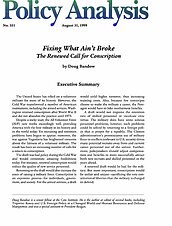The United States has relied on a volunteer military for most of its history. However, the Cold War transformed a number of American institutions, including the armed services. Washington retained conscription after World War II and did not abandon the practice until 1973.
Despite a rocky start, the All-Volunteer Force (AVF) now works exceedingly well, providing America with the best military in its history and in the world today. Yet recruiting and retention problems have begun to appear; moreover, the war against Yugoslavia has heightened concerns about the fairness of a volunteer military. The result has been an increasing number of calls for a return to conscription.
The draft was bad policy during the Cold War and would constitute amazing foolishness today. For instance, renewed conscription would reduce the quality of new service personnel.
Returning to the draft would also increase the costs of raising a military force. Conscription is an expensive process–for individuals, government, and society. For the armed services, a draft would yield higher turnover, thus increasing training costs. Also, because few conscripts choose to make the military a career, the Pentagon would have to hike reenlistment benefits. A draft would not improve the retention rate of skilled personnel or inculcate civic virtue. The military does have some serious personnel problems; however, such problems could be solved by returning to a foreign policy that is proper for a republic. The Clinton administration’s promiscuous use of military force in conflicts irrelevant to U.S. security drives many potential recruits away from and current career personnel out of the service. Furthermore, policymakers should adjust compensation and benefits to more successfully attract both new recruits and skilled personnel in the years ahead.
A renewed draft would be bad for the military. But more important, conscription would be unfair and unjust–sacrificing the very constitutional liberties that the military is charged to defend.

This work is licensed under a Creative Commons Attribution-NonCommercial-ShareAlike 4.0 International License.

